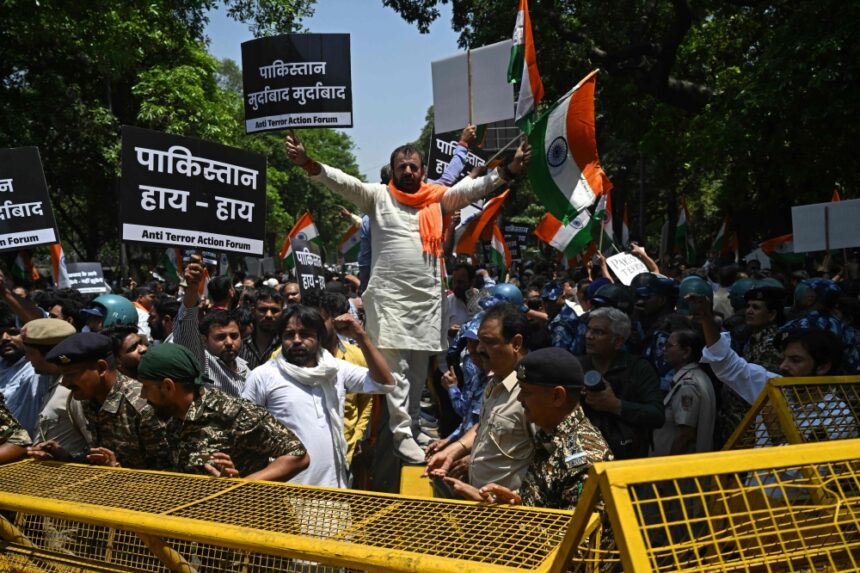NEW DEHLI, April 24 — Indian Prime Minister Narendra Modi vowed today to punish those responsible for killing 26 civilians in Kashmir, after his government blamed arch-rival Pakistan for backing the gruesome attack.
India accused Pakistan of supporting “cross-border terrorism” in the tourist hotspot of Pahalgam, where shooters carried out the worst attack on civilians in contested Muslim-majority Kashmir for a quarter of a century.
“I say to the whole world: India will identify, track and punish every terrorist and their backer,” Modi said in his first speech since the attack in the Himalayan region. “We will pursue them to the ends of the Earth”.
His government later ordered all Pakistani citizens in India to leave by April 29, with the exception of remaining diplomats.
While no group has claimed responsibility for the attack, Indian police have issued wanted notices for two Pakistanis and one Indian who they say are members of the Pakistan-based Lashkar-e-Taiba (LeT) group, designated by the United Nations as a terrorist organisation.
Police have offered a two million rupee ($23,500) bounty for information leading to each man’s arrest.
Modi, speaking in Bihar state to launch development projects, led two minutes of silence in memory of those killed, all but one of whom was Indian.
Pakistan, which denies any role in the Pahalgam attack, held a rare national security meeting on Thursday after New Delhi issued a raft of punitive diplomatic measures.
That included suspending a water-sharing treaty, the closure of the main land border crossing with Pakistan and downgrading diplomatic ties.
While the measures are largely symbolic, some fear New Delhi’s diplomatic moves may just be an opening salvo—with the potential risk of military action between the nuclear-armed neighbours.
At the Attari-Wagah frontier, Pakistani citizens had already started to leave.
“We just want to go home,” said exhausted-looking Mehnaz Begum, a Pakistani businessman from Karachi, as he left India.
“I say this unequivocally: whoever has carried out this attack, and the ones who devised it, will be made to pay beyond their imagination”, Modi said, speaking in Hindi in front of a large crowd.
“They will certainly pay. Whatever little land these terrorists have, it’s time to reduce it to dust. The willpower of 1.4 billion Indians will break the backbone of these terrorists.”
Kashmir has been divided between India and Pakistan since their independence in 1947, with both claiming the high-altitude territory in full but governing separate portions of it.
Rebel groups have waged an insurgency in Indian-controlled Kashmir since 1989, demanding independence or a merger with Pakistan.
The shooting on Tuesday marked a dramatic shift with the targeting of civilians, rather than smaller-scale attacks against Indian security forces, which are more common.
Modi finished his speech with rare comments in English, addressing an audience abroad.
“Terrorism will not go unpunished,” he said. “Every effort will be made to ensure that justice is done.”
Indian security forces have launched a vast manhunt for the attackers, with large numbers of people detained in the operation.
A soldier was killed on Thursday in clashes with gunmen at Basantgarh in Kashmir, the Indian army said.
Heartbroken and shocked
Kashmir’s main city of Srinagar appeared calm, with residents expressing shock at the attack—that has hit the region’s key tourist industry hard—and fear of what is to come.
“Everyone I have spoken to is heartbroken and shocked,” said Siddhi Wahid, a Kashmiri historian and political commentator.
Tuesday’s assault occurred as tourists enjoyed tranquil mountain views at the popular site at Pahalgam, when gunmen burst out of forests and raked crowds with automatic weapons.
Survivors told Indian media the gunmen targeted men, and spared those who could give the Islamic declaration of faith.
In Lahore, activists and members of the staged an anti-India protest on Thursday, angry over the scrapping of the water treaty.
“Water is our right, and God willing, we will reclaim it, even if that means through war,” said protestor Muhammad Owais.
The attack has enraged Hindu nationalist groups, and students from Kashmir at institutions across India have reported experiencing harassment and intimidation.
“It is a deliberate and targeted campaign of hate and vilification against students from a particular region and identity”, Jammu and Kashmir Students Association convenor Nasir Khuehami said. — AFP


